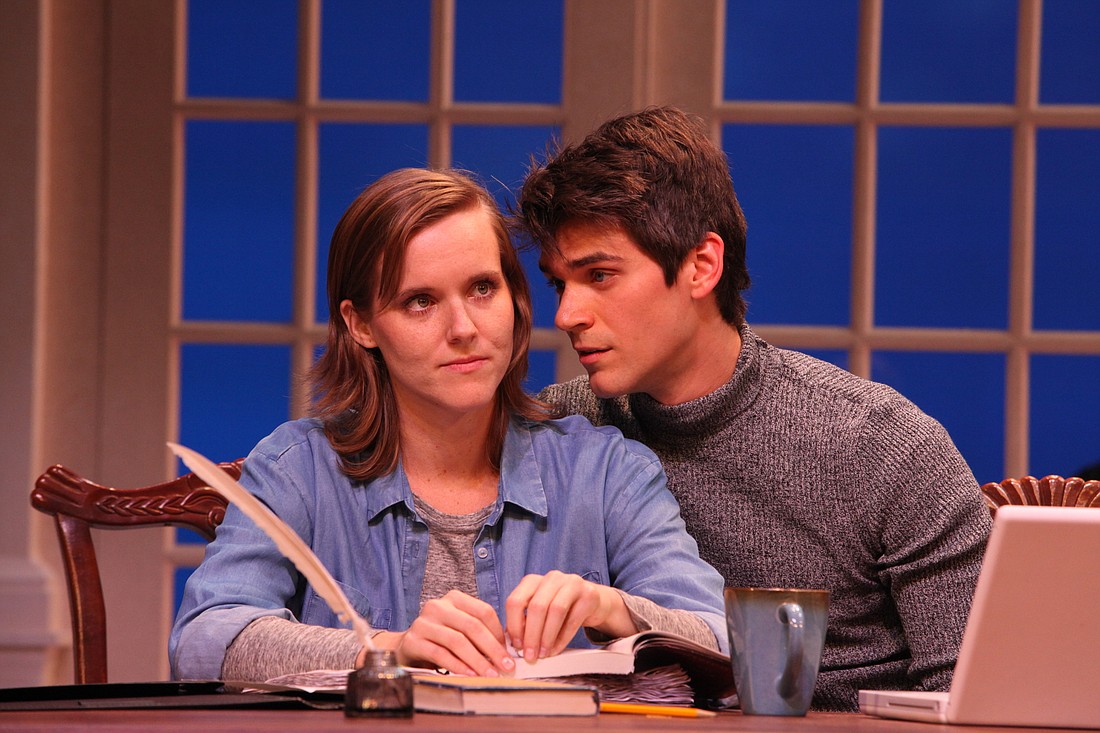- December 23, 2024
-
-
Loading

Loading

“Arcadia” sounds like a lighthearted pastoral romp. Don’t be fooled. Tom Stoppard’s 1993 play is a funhouse maze exploring the futility of scholarly ambition, the one-way nature of time, iterative sets, chaos theory, the second law of thermodynamics, the heat death of the universe, romantic and classical schemes for English country gardens, epistemology and the population cycles of grouse.
There’s also a love story and a mystery story, not necessarily in that order.
The place: Sidley Park, a country house in Derbyshire, England. The time: 1819. And, also, now. The play jumps around in time like “Doctor Who” on a bender.
The plot maze defeats summary. But here are a few interesting paths.
In 1809, a precocious young Thomasina Coverly (Carla Corvo) tries to nail down a proof of Fermat’s Last Theorem. From there, she takes a mad leap into thermodynamics. Years ahead of her time, Thomasina deduces that Isaac Newton was wrong. The universe isn’t a cosmic game of billiard balls. It’s more like a wind-up clock that’s doomed to run down.
Thomasina’s rakish young tutor, Septimus Hodge (Creg Sclavi), is amazed at her brilliance — though he’s distracted by his overactive libido. He’s recently enjoyed a “carnal embrace” with the wife of a bad poet. The offended scribbler (Marc Bitler) insists on a duel — and puts it in writing. This leads to a flurry of letters, reviews and dedications — and no duel. The documents get shoved into various books and forgotten.
More than a century later, Hannah Jarvis (Amber McNew) is quietly researching her next historical bestseller at the manor. Bernard Nightingale (Jonathan Grunert), shatters her peace and quiet. This preening peacock of a scholar insinuates himself by means of lies and flattery. Nosing about, Nightingale finds the lost texts and leaps to brilliant, if wrong, conclusions. Having achieved this epiphany, Nightingale insults everyone in sight, publishes his theory and digs a grave for his career.
There’s more to the play than that, which is like saying there’s more to “Ulysses” than a Jewish ad salesman saving a college kid from a fight at a brothel and going home to his unfaithful wife.
It’s demanding material, to state the obvious.
Director James Dean Palmer successfully keeps Stoppard’s intellectual and emotional plates spinning in the air — with no breakage at all.
Jeffrey Weber’s set evokes a place that’s neither here nor there. One room with a big table. That’s it. Classical architecture, but abstracted, like an architectural model come to life. It perfectly suits the play’s tone. Sofia Gonzalez’ period costumes smartly contrast the overstuffed past and the scruffy present. Christopher McVicker’s lighting dances between lucidity and obscurity. Now you see it, now you don’t.
The second-year student actors are all first-rate.
The characters of Thomasina and Hodge are the play’s beating heart. Kudos to Corvo and Sclavi for bringing them to life — they’re deeply moving in the scene where the young girl finally browbeats her tutor into teaching her to waltz. McNew and Grunert are perfect as two dueling scholars with a low flame of sexual tension. Bitler’s poet is a figure of fun — and even more hilarious because he takes himself utterly seriously.
In the past, Alex Pelletier’s Lady Croom is appropriately imperious — and sexually frustrated as well. In the present, Jillian Cicalese, Michael Judah and Brian Ritchie embody the Coverly family’s not-so-noble descendants — Chloe, Valentine and Gus. We’re privileged to see their family history — they’re not.
So, what does it all mean?
Stoppard’s a very clever writer; let’s leave it at that. But cleverness for its own sake is empty. And Stoppard is never empty. Beneath his big ideas and sparkling dialogue, there’s profound pain.
Lord Byron never dueled at this country manor. Nightingale’s theory is a joke. But there were other tragedies here.
Death came to Arcadia. It comes everywhere.
Newton was wrong. Thomasina was right.